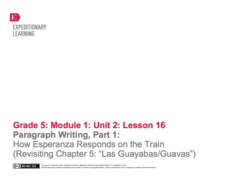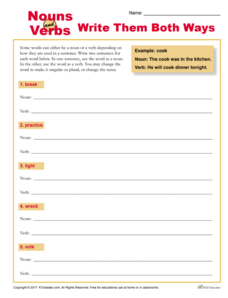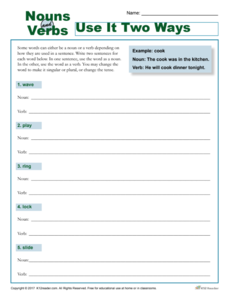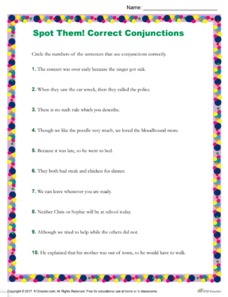Novelinks
The Winter’s Tale: Shakespeare’s Words
Varier wag? I'fecks? Posterns? As part of their vocabulary study, readers of The Winter's Tale try their hand at crafting Shakespearian-style sentences using words drawn from the play.
Curated OER
Sentence Patterns II: Locating Objects and Complements
What sets this worksheet apart are the clear, concise explanations for some rather complex grammatical terms. Object complements, subject complements, transitive and intransitive verbs, and direct and indirect objects are all carefully...
Curated OER
Man's Search for Meaning: Vocabulary Strategy
Readers of Man's Search for Meaning use context clues, create stories using words from the text, and retype these stories as part of their vocabulary study of Viktor Frankl's book.
K12 Reader
Add an Interjection
Wow! Here's a worksheet about interjections! After reading a brief definition of this part of speech, young grammarians select an interjection from the provided word bank to add to a sentence.
EngageNY
Paragraph Writing, Part 1: How Esperanza Responds on the Train (Revisiting Chapter 5: "Las Guayabas/Guavas")
When your class members have completed the novel Esperanza Rising, they will be ready to write an expository essay on how Esperanza responds to events and what this says about her character. Set your pupils up for success by...
K12 Reader
Find the Pieces: Predicate Adjective, Noun and Verb
This activity is helpful! Young grammarians review ten simple sentences, each with a subject, linking verb, and predicate adjective, before noting each part of speech appropriately.
Karlstads Universitet
Pronoun Reference and Antecedent Agreement
The concept of pronoun-antecedent agreement is much easier to understand with solid examples. An explanatory presentation provides an overview of pronoun-antecedent agreement, as well as a series of sentences that feature different...
K12 Reader
Nouns Verbs: Write it Both Ways
A worksheet gives scholars the opportunity to take five words and use them as a noun and a verb. Changing the verb tenses and making nouns singular or plural work to compose a grammatically correct sentence.
K12 Reader
Nouns Verbs: Use It Two Ways
Scholars show what they know about nouns and verbs in a activity that requires them to read five words then use them in two sentences—as a noun and a verb.
K12 Reader
Adjectives Describe
Vivid writers all start out the same way: learning in elementary school how to use a variety of adjectives! Young grammarians add adjectives to eight fill-in-the-blank sentences.
K12 Reader
Conjunctions: Connecting Subjects
Having two subjects seems like it makes a sentence more complicated, but it's as easy as adding an extra conjunction! Connect subjects with eight sentences that are each missing an important and.
University of Victoria
Agreement with Indefinite Pronouns
Why can't they agree? Scholars learn about agreement with indefinite pronouns with online materials. First they learn what indefinite pronouns are as well as examples. They look at examples of indefinite pronouns used in sentences before...
Curated OER
Using Saber and Conocer
What is the difference between saber and conocer? Language learners sometimes have difficulty with these words because of their similar meaning. Clear up confusion with the information and presentation included here. The website and...
K12 Reader
Subject Pronouns
What or who can subject pronouns stand for? Ask your learners to determine the correct subject pronoun for 25 sentences. Learners are given the subjects and choose the pronouns from a chart of options.
K!2 Reader.com
Interrogative Pronouns
To whom will you assign this exercise that focuses on interrogative pronouns? Your students, of course! Learners complete 18 sentences by adding in the correct interrogative pronouns. The page includes a list of pronouns to choose...
Grammar Net
Reported Speech
What did he say? Learn to report what another person said with a worksheet focused on reported speech. As kids read 20 short statements, they reply with a sentence frame to report what they have learned from each statement.
K12 Reader
Order of Adjectives: Add Another
Some nouns need more than one adjective to adequately describe them. Using a reference poster that puts twelve categories of adjectives in order, class members fill in the blanks to complete eight sentences.
K12 Reader
Spot Them! Correct Conjunctions
Young grammarians demonstrate their understanding of conjunctions by identifying sentences on a short learning exercise that use conjunctions correctly.
K12 Reader
Conjunctions: Connecting Predicates
Forget walking and chewing gum—the subjects of these sentences can perform several actions at once! Practice connecting predicates with conjunctions in a helpful grammar instructional activity.
Vocabulary A-Z
5-Day Vocabulary Teaching Plan
Reinforce important reading skills with a set of vocabulary lesson plans. Middle schoolers complete sentences, play word games, finish analogies, and build their growing vocabulary with a packet of helpful and applicable graphic organizers.
Santa Monica-Malibu Unified School District
Parts of Speech Nouns: Building Blocks of Grammar
An engaging PowerPoint presentation helps scholars learn the definition of a noun and provides examples of different types of nouns, such as person, place, abstract, and concrete nouns. Formative assessments within the resource check...
K12 Reader
Missing Nouns
Scholars use nouns from a word bank to complete sentences in a fill-in-the-blank instructional activity that tells a tale about the California Gold Rush.
Curated OER
Sentence Game
Students explore and study what they already know about grammar and sentence structure to reinforce their mastery of assessing the eight parts of speech. They match a set of colored word cards with their correct part of speech and create...
Curated OER
Sentences: The Naming Part #2
For this sentence worksheet, students read about the "naming part" of a sentence, then fill in blanks to correctly complete a set of 5 simple sentence.
Other popular searches
- Labeling Parts of Sentences
- Telling Parts of Sentences
- Parts of Sentences
- Naming Parts of Sentences
- Action Parts of Sentences
- Parts Speech Sentences
- Parts of Speech in Sentences
- Misplaced Parts of Sentences
- Name Parts of Sentences
- Sentences Parts of Speech
- Reconstruct Parts of Sentences























